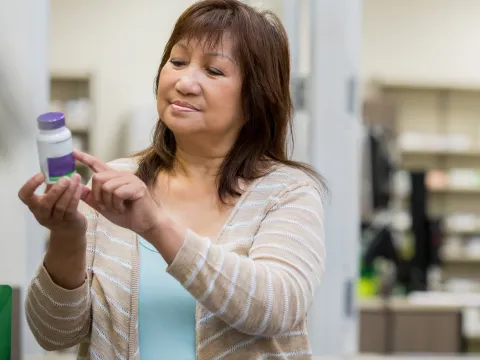- AdventHealth

Caring for aging parents can be a time to connect with loved ones and help guide them to whole health. But it can also be full of worry as they — and you — manage illnesses or chronic health conditions.
Since your parents may be facing multiple issues all at once that require a complex regimen of medicines, it can become difficult and overwhelming to manage them and watch for side effects. And, you may have a lot of questions. For instance, you may want to know:
- Are my parents remembering to take their medicines?
- What medications are safe to take together?
- Are these medications causing any serious side effects?
Gain Peace of Mind With a Pharmacy Consult
A pharmacy consult — where your local pharmacist sits down with you to discuss your questions and concerns and help you and your parents create a safe routine for medicine — can help give you peace of mind. A pharmacy consult may:
- Identify any errors in prescriptions or medication recommendations
- Identify possible harmful drug or disease interactions
- Improve treatment efficacy
- Improve patient safety
- Reduce the risk of accidentally doubling up of the same drug with multiple pill bottles
- Remove barriers keeping parents from taking medication as prescribed
Preparing for the Consult
Most community pharmacists are easily accessible in local drug stores, or wherever your parents get their prescriptions filled.
First, call the pharmacy and ask to schedule a 15- or 30-minute consultation with the pharmacist. Most community pharmacies offer Medication Therapy Management (MTM) services that are available for a fee and often paid for by various prescription insurance plans. Before the appointment:
- Bring a list of surgeries and medical providers (including phone and fax numbers)
- Gather all medicine, including over-the-counter medications, prescriptions, herbal supplements, vitamins, eye drops or anything else your parents take on a regular basis
- Make a complete list of medications
Giving these items to the pharmacist before the appointment will allow him or her to create a chart or profile for your parents.
During the Consult
The pharmacist will review each medication with you, taking care to make sure all your questions are answered. He or she will also ensure everything your parents are taking is safe, effective and working to improve their whole health. This may include:
- Correcting dosage amounts, in partnership with your parents’ doctors
- Eliminating unnecessary medicines
- Educating you and your parents about drug safety, including serious side effects and what your parents can take over-the-counter with their prescription medication
Establishing a routine for medication, including:
- What medicine to take in the morning and what to take before bed
- Which medications should be taken with food
- What food or drink to avoid when on certain medications
- Remove barriers that are keeping your parents from taking medications
Sometimes, older adults don’t take their medicine as prescribed — not because they don’t want to, but because they can’t. Your pharmacist can assess whether your parents have impairments that make it difficult to read instructions, open medication bottles, or organize supplies to take medication as prescribed.
After the Pharmacy Consult
After the consult is complete, your pharmacist may make recommendations to help your parents improve their medication routine. The pharmacist may need to contact the prescribing doctor(s) again to review any recommendations made to optimize the patient’s health care.
A Strong Partnership for Better Health
Your parents’ pharmacist works closely with their doctor(s). This helps ensure everyone is on the same page — including you, your parents and all their providers. A strong relationship between pharmacists and doctors creates open communication and builds trust and understanding to ensure your parents are receiving the exact medication they need.
Supporting Whole Health at Every Age and Stage
Ultimately, medication therapy management is an ongoing process that needs to be tweaked so that new illnesses, diagnoses or chronic conditions can become better managed. Because people have changes in their bodies as they age, the elderly may be more sensitive to certain medications and less sensitive to others. Be sure to let your parents’ pharmacist know how they respond to new medication, if that changes with time and any new medication they are prescribed.
This ongoing relationship will strengthen your parents’ independence and supports whole health at every stage and age.



